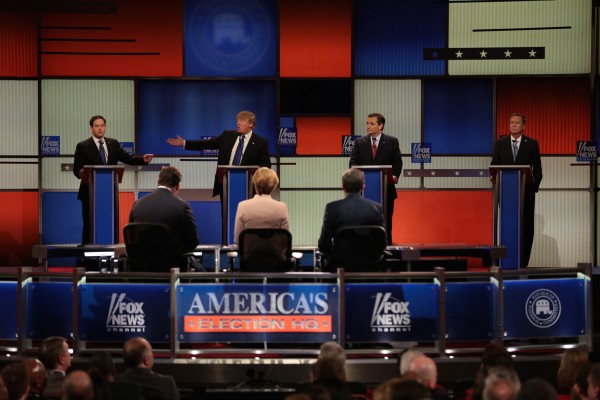The Importance of the 2016 Presidential Election
TNS
The race for the Republican nomination has ultimately boiled down to Donald Trump, Ted Cruz, Marco Rubio, and John Kasich. (SALWAN GEORGES-DETROIT FREEPRESS VIA TNS)
March 11, 2016
As I sat watching the Republican debate on March 3, enduring the consistent bickering back and forth that often had little to do with the actual issues plaguing America today, the true importance of this year’s election seemed awfully clear.
Donald Trump has consistently done well in the Republican primaries, coming in first place in Massachusetts, Alabama, Oklahoma, Kentucky and Michigan, just to name a few. In total, Trump has won 384 delegates while Ted Cruz, in second place, has won 300.
But, understandably, the Republican Party does not truly want to nominate Trump; this much is clear, and no one can actually blame them for feeling this way. After all, Trump has a laughable understanding of what constitutes “foreign policy,” and his proposed plans for dealing with ISIS, Syrian refugee influxes and Mexican illegal immigration would inevitably harm American relations with Mexico, Russia and our allies in the Middle East.
There is also the simple fact that Donald Trump is not truly a Republican, but rather a radical populist. He is a candidate that strikes at the nerves of common Americans, which is why he consistently mentions things like the perceived threats of terrorism from Islamic nations and the possibility of illegal immigrants stealing potential jobs away from hard-working Americans. These are things that disgruntled citizens are talking about constantly at the dinner table, and it doesn’t help matters much that the Obama administration has frequently been criticized for being an administration of inaction. When American, British and even Japanese journalists and aid workers were being decapitated by ISIS, there were many calls on the part of American citizens to the Obama administration for action. With this context in mind, it makes perfect sense that Trump’s repeated argument of “we need to just go wipe them out” is so appealing.
But still, despite Trump’s rampant popularity, it is doubtful he will receive the Republican nomination. His disastrous policies aside, Trump made it clear back in August of 2015 that he was not someone who had the Republican Party’s best interests at heart when he refused to take the oath that would have held him to supporting whomever the eventual Republican nominee would be, as running an independent campaign would almost certainly siphon votes away from that individual and make victory easier for the Democratic candidate. This means that the Republican Party is in a very tough spot right now; either they nominate an individual who is completely unqualified, someone reviled by virtually every other major player in the party he is using and who will cut off ties to major American allies, or they go against the popular vote and nominate someone like Marco Rubio or Ted Cruz. The last time this happened was the 2000 election.
But there’s a very important lesson to take away here, and it’s one that the Republican Party isn’t really hearing. If we look over to the Democratic Party, we see a situation that exists in somewhat of a mirror: the popularity of Bernie Sanders. While many people had written Sanders off as a nobody when he first entered the race, he has since proven himself a viable competitor for Hillary Clinton, actually winning the Colorado, Vermont, Maine and New Hampshire caucuses and virtually tying in Iowa. His relationship to Trump? The fact that he isn’t truly a Democrat either.
Bernie Sanders has made it public knowledge that he identifies as a “democratic socialist,” and is only using the Democratic Party to get himself into the presidency and enact the changes that he believes the U.S. desperately needs. When you see statistics that show more delegates and superdelegates have pledged their support to Hillary Clinton—even though they are free to change their mind until July—it is because it is very difficult to lend support to a man who is essentially manipulating the two-party system, whatever his motivations may be. Bernie Sanders is, for all intents and purposes, a radical. His incredibly expensive tax plan, which would supposedly raise $15.3 trillion in only 10 years, and his talks of instituting free education using models like Switzerland and Sweden, known socialist countries, have supported this fact.
However, the immense amount of support for both Sanders and Trump is indicative of one thing: the American people are thirsty for change. Not the false promises of change that Obama had offered when he first ran for president, but actual change. And this push for change is indicative of a growing fear of both external threats and internal deficiencies, the kinds of fears that Trump is exploiting, and Sanders claims he can fix.
What is clear is that simply being the “establishment candidate” isn’t going to cut it anymore. Ted Cruz, for instance, talks a lot about repealing Obamacare, but Obamacare was meant to be a band-aid placed over a system that was itself broken. Going forward, the Republican candidates running for president need to be able to hit the same nerves that Trump does, and reassure the people that their fears are being heard, or else the Republican Party may very well be forced to nominate a man whose idea of foreign policy boils down to building a wall with a cost forced upon the nation he’s trying to keep out.











Anonymous • Apr 27, 2016 at 8:49 am
You should be more careful with your words… it is a Syrian refugee CRISIS. To reduce it to an influx is to perpetuate the lack of knowledge regarding one of the greatest humanitarian crises of our lifetime.